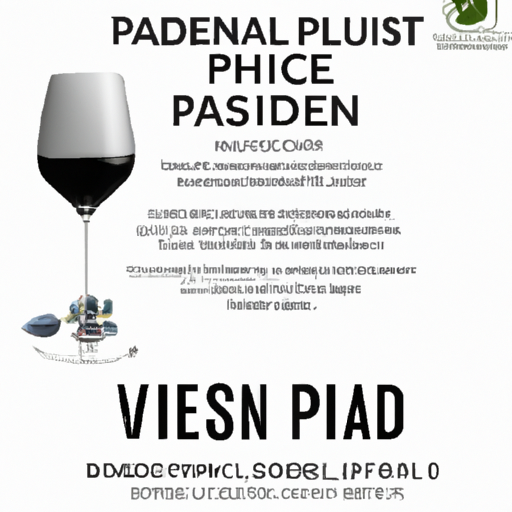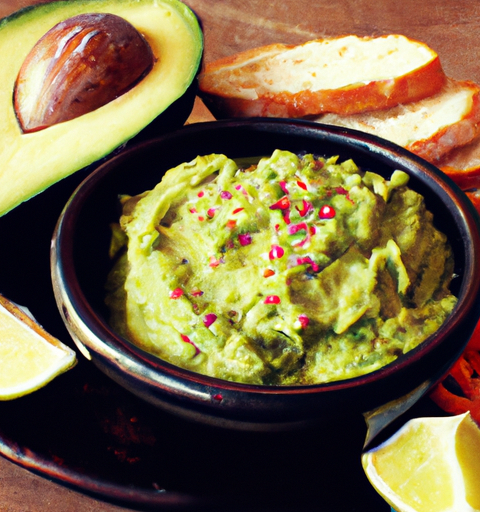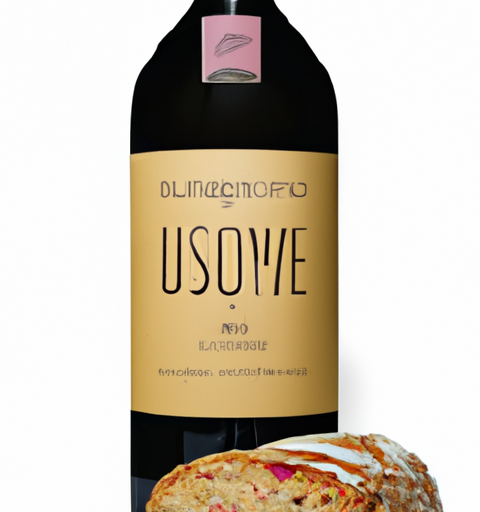In this article, you will discover the ultimate guide to plant-based food and wine pairings. We will provide you with valuable information and tips on how to create the perfect combination between plant-based dishes and wines. Whether you’re a foodie or simply interested in exploring this topic, we’ve got you covered. So, get ready to enhance your culinary experience with our expert insights and suggested food and wine articles. And don’t forget to check out plant food + wine yelp for even more inspiration!
The Ultimate Guide to Plant-Based Food and Wine Pairings
As more and more people embrace plant-based diets, the need for delicious and satisfying food options has become increasingly important. But why stop at just the food? Pairing plant-based dishes with the perfect wine can elevate the dining experience and create a harmonious blend of flavors. In this ultimate guide, we will explore the world of plant-based food and wine pairings, learn about flavor profiles, and discover regional and culinary traditions that enhance the enjoyment of these combinations.
What is plant-based food?
Plant-based food refers to meals and dishes that primarily consist of ingredients derived from plants. This includes fruits, vegetables, grains, legumes, nuts, and seeds. Plant-based diets have gained popularity due to their health benefits, environmental sustainability, and ethical considerations. Whether you follow a vegan, vegetarian, or flexitarian lifestyle, plant-based food offers a wide variety of flavors and textures that can be enhanced through thoughtful wine pairings.
What is wine pairing?
Wine pairing is the art of selecting and serving the right wine to complement and enhance the flavors of a particular dish. The goal of wine pairing is to create a harmonious balance between the food and the wine, where neither overpowers the other. The right wine can enhance the flavors of the dish, cleanse the palate, and create a memorable dining experience.
Why focus on plant-based food and wine pairings?
The world of plant-based foods is vast and diverse, offering a multitude of flavors, textures, and culinary possibilities. By focusing on plant-based food and wine pairings, you can expand your palate and explore new flavor combinations. Additionally, plant-based dishes often have distinct flavors that can be complemented or contrasted with different wines. Understanding how to pair wine with plant-based food will not only enhance your dining experience but also allow you to fully appreciate the flavors of both the dish and the wine.
Principles of successful pairings
Before diving into specific pairings, it’s important to understand the principles of successful food and wine combinations. One key principle is to consider the intensity of flavors. Light dishes are usually best paired with lighter wines, while bolder dishes can handle richer and more robust wines. Matching the acidity of the wine with the flavors of the food is also crucial. Acidic wines can cut through the richness of certain dishes, while sweeter wines can balance spicy or savory flavors. Another principle to consider is the texture and weight of the dish. Heavier dishes can be complemented by full-bodied wines, while lighter dishes may benefit from a lighter-bodied wine. Lastly, personal preferences play a significant role in pairings. Don’t be afraid to experiment and trust your own taste buds.
Types of Plant-Based Food and Wine Pairings
Now that we have established the foundation of food and wine pairing, let’s explore different types of plant-based dishes and the wines that complement them.
Pairing red wine with plant-based dishes
Red wine is often associated with rich, hearty flavors, making it a popular choice for many plant-based dishes. Its tannins and depth of flavor can create a perfect balance with dishes such as mushroom risotto, lentil stew, or grilled vegetable kebabs. Opt for red wines with medium to full-body, such as Cabernet Sauvignon, Pinot Noir, or Malbec, to enhance the flavors of these dishes.
Pairing white wine with plant-based dishes
White wine offers a refreshing and versatile option for pairing with plant-based dishes. Lighter dishes such as fresh salads, vegetable stir-fries, or citrus-based dishes can be wonderfully complemented by crisp and acidic white wines. Consider Sauvignon Blanc, Pinot Grigio, or Chardonnay to enhance the flavors of these dishes and provide a cool, refreshing contrast.
Pairing rosé wine with plant-based dishes
Rosé wine, with its delicate and fruity flavors, is a fantastic choice for pairing with plant-based dishes. Its versatility allows it to pair well with a variety of dishes, from light salads and vegetable-based pastas to grilled vegetables and Mediterranean-inspired dishes. Opt for a dry rosé with balanced acidity and notes of red fruits to enhance the flavors of your plant-based creations.
Pairing sparkling wine with plant-based dishes
Sparkling wine adds a touch of celebration to any plant-based meal. Its effervescence and crispness can elevate the dining experience and cleanse the palate between bites. Pair sparkling wine with light and refreshing plant-based dishes such as fresh fruit salads, vegan sushi rolls, or bruschetta. Prosecco, Champagne, or Cava are excellent choices to create a harmonious balance of flavors.
Pairing dessert wine with plant-based dishes
Dessert wine offers a sweet finale to any plant-based meal. Its richness and sweetness can complement desserts such as vegan chocolate cake, fruit tarts, or nut-based pies. Opt for a late-harvest Riesling, Moscato, or Port wine to enhance the flavors of your plant-based desserts and create a satisfying end to your meal.
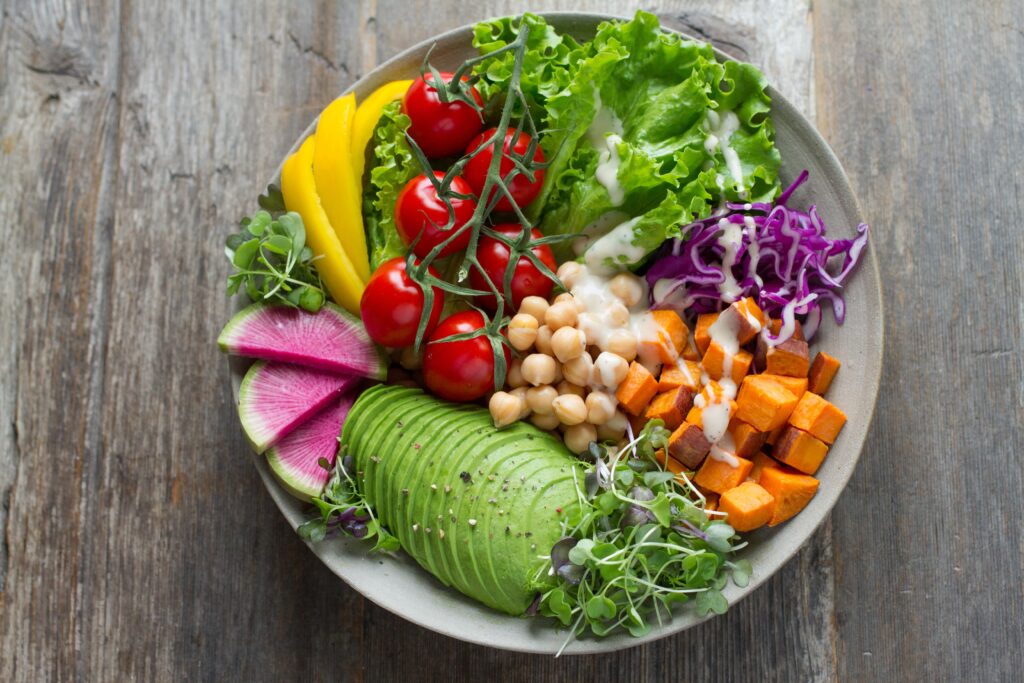
Exploring Flavor Profiles
To truly understand how to pair plant-based food with wine, it’s essential to explore the flavor profiles of both the ingredients and the wines themselves.
Understanding the flavor profiles of plant-based ingredients
Plant-based ingredients have a wide range of flavors, from earthy and savory to sweet and tangy. For example, mushrooms have an umami taste that pairs well with wines that have earthy or herbal notes. On the other hand, citrus fruits offer a bright and acidic flavor that can be complemented by crisp and citrusy white wines. Understanding the flavor profiles of plant-based ingredients can help you choose the right wine to enhance and balance those flavors.
Identifying the flavor profiles of different wines
Wines have their own unique flavor profiles that can range from fruity and sweet to dry and acidic. For example, Sauvignon Blanc often has notes of tropical fruits and citrus, while Cabernet Sauvignon can have flavors of blackberries and spices. Recognizing these flavor profiles can help you determine which wines will pair best with specific plant-based dishes.
Finding complementary flavors in plant-based food and wines
When pairing plant-based food with wine, it’s important to consider complementary flavors. Look for flavors that enhance and balance each other. For example, a citrusy white wine can complement the tanginess of a tomato-based plant-based dish, while a rich and spicy red wine can enhance the flavors of a hearty mushroom stew. By finding complementary flavors, you can create a harmonious blend of tastes that elevates the dining experience.
Common Plant-Based Food and Wine Pairings
Now that we have a better understanding of flavor profiles and principles of pairing, let’s explore some common plant-based food and wine combinations.
Pairing plant-based burgers with red wine
Plant-based burgers, made from ingredients such as mushrooms, beans, or soy, can be perfectly paired with a medium-bodied red wine. The rich and savory flavors of the burger can be enhanced by the tannins and depth of flavor in wines like Cabernet Sauvignon or Pinot Noir. Opt for a slightly chilled red wine to balance the heartiness of the burger.
Pairing vegetable stir-fry with white wine
A light and refreshing vegetable stir-fry can be beautifully complemented by a crisp and citrusy white wine. The acidity in the wine can cut through the flavors of the stir-fried vegetables and provide a refreshing contrast. Consider pairing your stir-fry with a Sauvignon Blanc or a Pinot Grigio for a delightful dining experience.
Pairing plant-based sushi with rosé wine
The delicate flavors of plant-based sushi, filled with fresh vegetables and nori, can be wonderfully enhanced by a dry and fruity rosé wine. The crispness of the wine can balance the textures of the sushi and provide a complementary accompaniment. Look for a rosé with notes of red fruits, such as strawberries or cherries, to create a harmonious pairing.
Pairing plant-based salads with sparkling wine
Fresh and vibrant plant-based salads can be elevated to new heights when paired with a refreshing glass of sparkling wine. The effervescence and crispness of the wine can cleanse the palate and provide a burst of flavor between bites of crisp greens and vegetables. Opt for a Prosecco or a Champagne to create a celebratory and refreshing combination.
Pairing vegan chocolate cake with dessert wine
Indulge in the decadence of a vegan chocolate cake by pairing it with a sweet and luscious dessert wine. The richness and sweetness of the wine can balance the deep flavors of the chocolate and provide a satisfying end to your meal. Consider a late-harvest Riesling or a Port wine to create a delightful combination of flavors.
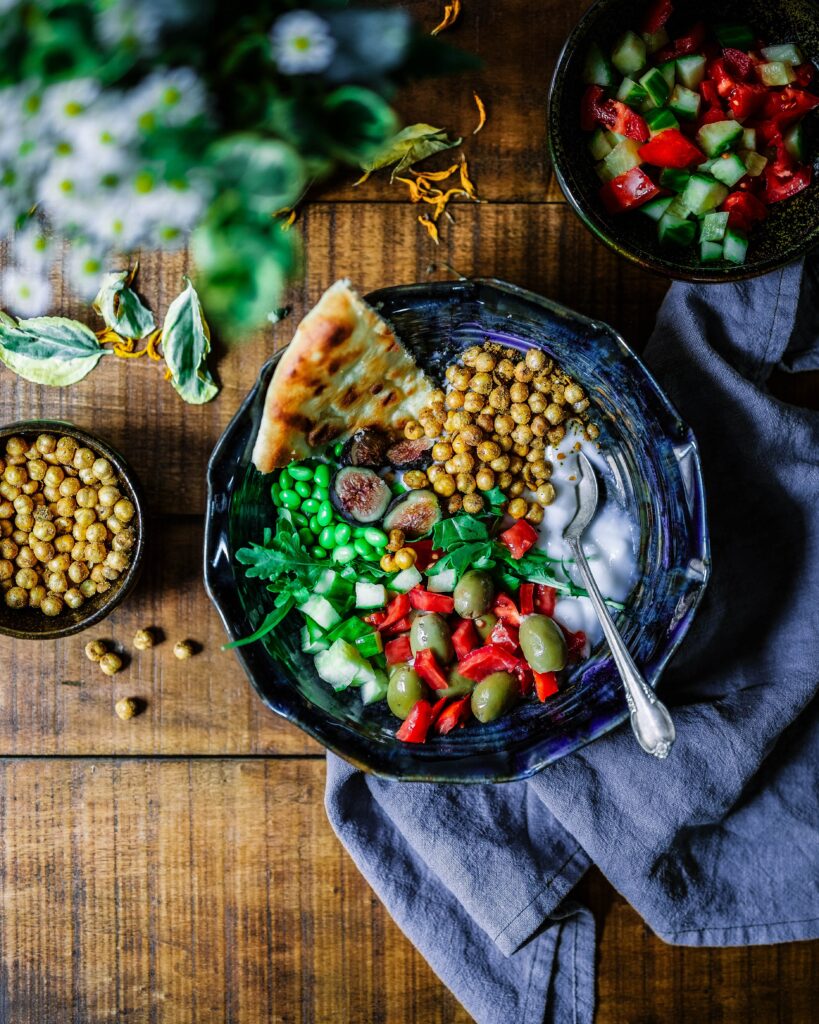
Regional Pairings and Culinary Traditions
Different regions and culinary traditions offer unique plant-based food and wine pairings that reflect their local flavors and ingredients. Here are some examples:
Mediterranean plant-based food and wine pairings
Mediterranean cuisine, known for its use of fresh vegetables, olive oil, and herbs, pairs exceptionally well with light and crisp white wines such as Sauvignon Blanc or Vermentino. Dishes like Greek salad, falafel, or ratatouille can be beautifully complemented by these wines, enhancing the flavors of the Mediterranean ingredients.
Asian-inspired plant-based food and wine pairings
Asian-inspired plant-based dishes, such as stir-fried noodles, tofu curries, or sushi rolls, can be paired with a variety of wines. Crisp and fruity white wines like Riesling or Gewürztraminer can enhance the flavors of spicy or tangy dishes, while light and refreshing rosé wines can provide a harmonious contrast to savory or umami flavors.
Latin American plant-based food and wine pairings
Latin American cuisine offers a vibrant array of plant-based dishes, from Mexican tacos to Peruvian ceviche. These flavorful dishes can be complemented by wines that balance the heat and spice, such as a Malbec or a Carmenere. The fruity flavors and moderate tannins of these wines can enhance the richness and complexity of Latin American ingredients.
Middle Eastern plant-based food and wine pairings
Middle Eastern cuisine, known for its use of spices, herbs, and legumes, offers a wide variety of plant-based dishes that can be paired with different wines. From Lebanese hummus to Moroccan tagines, the earthy and aromatic flavors can be beautifully complemented by wines like Syrah or Grenache. These red wines can enhance the bold flavors and nuances of Middle Eastern ingredients.
Tips for Perfect Pairings
Achieving the perfect plant-based food and wine pairing doesn’t have to be daunting. Here are some tips to ensure a successful and enjoyable experience:
Considering the intensity of flavors
Match the intensity of the dish with the intensity of the wine. Lighter dishes, such as salads or vegetable-based appetizers, pair well with lighter wines. Bolder and heartier dishes, such as stews or roasted vegetables, can handle richer and more full-bodied wines.
Matching wine acidity with food flavors
Consider the acidity of the wine and how it complements the flavors of the dish. Acidic wines can cut through the richness of certain dishes, providing a refreshing contrast. Sweeter wines can balance spicy or savory flavors, creating a harmonious blend of tastes.
Experimenting with contrasting flavors
Don’t be afraid to experiment with contrasting flavors. Sometimes, unexpected pairings can create a delightful surprise. For example, the tanginess of a tomato-based dish can be complemented by a citrusy white wine, or the richness of a hearty mushroom stew can be enhanced by a bold and spicy red wine.
Considering texture and weight in pairings
Take into account the texture and weight of the dish when choosing a wine. Heavier dishes can be paired with full-bodied wines, while lighter dishes may benefit from a lighter-bodied wine. The goal is to create a balance where neither the food nor the wine overpowers the other.
Taking personal preferences into account
Ultimately, trust your own taste buds and personal preferences. Experiment with different combinations and find what works best for you. The joy of food and wine pairings lies in the exploration and discovery of what delights your senses.

Exploring Non-Alcoholic Alternatives
While wine is a popular choice for pairing with plant-based dishes, there are also non-alcoholic alternatives that can provide a similar experience. Non-alcoholic beverages such as sparkling water, flavored sodas, or mocktails can be paired with plant-based dishes to enhance the flavors and create a refreshing combination. Consider matching the flavors of mocktails with the ingredients in your plant-based dishes to create a complementary blend of tastes.
Vegan and Organic Wine Pairings
For those who follow a vegan or organic lifestyle, there are specific wine options available that align with these preferences.
Exploring vegan wine options
Vegan wines are made without the use of any animal-derived fining agents or additives. These wines can be paired with plant-based dishes without compromising your vegan principles. Look for wines that are labeled as vegan or inquire with the producer to ensure the wine meets your dietary requirements.
Pairing organic wines with plant-based dishes
Organic wines are made from grapes that have been grown without the use of synthetic pesticides, herbicides, or fungicides. Pairing organic wines with plant-based dishes can create a harmonious combination that reflects a commitment to both the environment and your own well-being. Look for wines that carry an organic certification to ensure you are choosing wines that meet these standards.
Understanding biodynamic wine and plant-based food pairings
Biodynamic wines take organic farming principles to the next level by incorporating holistic and sustainable practices that align with the lunar calendar and natural rhythms. These wines can provide a unique and vibrant complement to plant-based dishes. Exploring the world of biodynamic wines can add an extra layer of depth to your plant-based food and wine pairing experience.

Special Occasions and Pairings
Plant-based dishes paired with the right wine can make special occasions even more memorable. Whether you’re hosting a holiday gathering or a dinner party, consider these tips for perfect pairings:
Pairing plant-based dishes with wine for holidays
Holidays are often filled with indulgent and festive dishes that can be beautifully paired with the right wine. For Thanksgiving, consider pairing plant-based stuffing with a medium-bodied Pinot Noir or Beaujolais. For Christmas, complement roasted veggies with a rich and velvety Cabernet Sauvignon or Merlot. The possibilities are endless, so don’t be afraid to experiment and create your own holiday traditions.
Wine pairing tips for dinner parties and gatherings
When hosting a dinner party or gathering, it’s important to consider the preferences of your guests. Offer a variety of plant-based dishes that can be paired with different wines to accommodate different tastes. Provide a range of options, from light and crisp white wines to full-bodied red wines, to ensure there is something for everyone. Encourage your guests to experiment and discover their own favorite pairings.
Conclusion
Embracing plant-based food and wine pairings opens up a world of flavors and possibilities. From exploring the flavor profiles of plant-based ingredients and wines to finding complementary combinations, the journey of pairing plant-based food with wine is one filled with exploration and experimentation. Whether you’re enjoying a simple weeknight meal or hosting a special occasion, the right wine can enhance the flavors of plant-based dishes and create a truly memorable dining experience. Cheers to the ultimate guide to plant-based food and wine pairings, and may your culinary adventures be filled with delicious discoveries!
